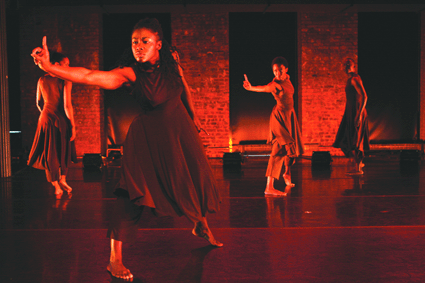Invoking the spirit of Pearl Primus
We live in discouraging times, but whenever self-doubt creeps in, we have only to look to Urban Bush Women and sup the nourishment this company of women of African ancestry provides. These dancers must train like an army—an army of lovers, that is—and as we used to say, an army of lovers cannot fail. Entering their 22nd year, Jawole Willa Jo Zollar’s troupe has added what seems like a subtitle—“Sassy, Strong, Relevant”—in bold type on their Dance New Amsterdam season program notes right under the company’s upper-cased name. Zollar’s paired tributes to Pearl Primus—a highlight of the two-program season—absolutely support this new slogan.
Members of the current UBW troupe—Maria Bauman, Christal Brown, Nora Chipaumire, Nia Eubanks, Wanjiru Kamuyu, Christine King, Paloma McGregor, and Rhea Patterson—have been associated with Zollar’s work for anywhere from one or a few years to nearly two decades. Yet they performed as a perfect, seamless unit and with ferocity unmatched by most dance companies in formal theatrical space. DNA’s tiny theater enhanced the experience, pulling helpless viewers into the vortex of each dance. I suspect that UBW is not, at least in theory, for every taste. You might prefer dance that’s abstract, cool, less dramatically expressive, less driven by social history and concerns, but when you’re mere feet away from Kamuyu’s undulating muscles, watching sweat bead and glisten like silver on her scowling Kenyan face, I defy you to remain totally aloof. The spirit that moved Pearl Primus—Trinidad-born cultural anthropologist, choreographer, and dancer—moves Zollar who, in turn, fully intends for it to similarly seize her audiences.
Like Zollar’s “Batty Moves”—a celebration of black women’s buttocks—and “Hair Stories”—a fiesta of everything black hair can be, do, and signify, “Walking With Pearl…Africa Diaries” (2004) and the premiere, “Walking With Pearl…Southern Diaries,” do more than simply flirt with typically cartoonized and fetishized images. They embrace them with all the defiant affirmation of Ntozake Shange finding god in herself and loving her fiercely. “Southern Diaries,” informed by the black religious tradition of the ring shout, gives the women a safe space to gather as a community and bellow to the high heavens. These are indomitable women who know exactly what they must do daily to praise their Lord, stand up to The Man, and heal broken hearts. Their great gales of laughter are orgasmic. Healing requires sound—those hard, rhythmic footfalls that sometimes remind us of South African gumboot dancing, those mournful or ecstatic songs, those screams of joy or grief. “Southern Diaries” includes a Primus sample—the 1945 “Hard Times Blues, re-staged by Kim Bears-Bailey—in which the powerful soloist Christal Brown compresses her sisters’ experiences of deprivation into a whirling, explosive ball of frustration and rage.
Based on archived interviews with Primus about her research journeys to the American South—where women told the anthropologist stories, “some made up, some true”—“Southern Diaries” shares an unrelenting intensity with the earlier “Africa Diaries.” Opening the evening, Zollar gracefully drifts towards the lectern where she will read selections from Primus’s journals. She slowly moves, waving her arms like currents of air as birds chirp and chimes sound. Beyond this serene beginning, both dances lack gentle stillness and reflection, but then again, Primus did call dance a “fist” with which she sought to smite prejudice.
We experience “Africa Diaries” as a kind of roiling, churning matrix in which at any moment any one of the women can become Primus carefully observing and learning juicy, polyrhythmic steps and sacred lore from the strong warrior women who surge around her. These women continuously grab and scoop energy from their world into themselves, into their contracted torsos, and fling it back outward. Worlds rise and fall and rise again in their dancing and their audible breaths. Viewing an African sunset and nightfall brings on waves and pulses of ecstatic dancing and reminds us that many ancient ancestors regarded the sun as a god.
“In the dance, I have unfolded my most secret thoughts,” Primus wrote. Zollar’s dancers unfold such depths of unguarded feeling before us that we must take care—oh, such great care—that we do not get swallowed up by it all and become similarly truthful about ourselves.
gaycitynews.com


































